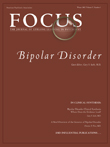Comment on Guideline Watch: Practice Guideline for the Treatment of Patients with Bipolar Disorder, 2nd Edition
In the year since publication of the Watch, the results of several clinically important studies have been published. The efficacy of aripiprazole (1) and divalproex extended release (2) in the acute treatment of mania were each demonstrated compared to placebo. Olanzapine and risperidone monotherapy were equivalent in the acute treatment of mania (3). The efficacy of quetiapine in the acute treatment of bipolar depression was confirmed in a second study (4), and the drug has received FDA approval for the treatment of bipolar depression. The olanzapine/fluoxetine combination was found to be superior in efficacy compared to lamotrigine, but had considerably more side effects (5). Both aripiprazole (6) and olanzapine (7) were found to be superior to placebo in maintenance therapy. Several studies have supported the use of cognitive behavioral therapy or systematic psychoeducation to prolong remission (8–10).
1 Sachs et al. Aripiprazole in the treatment of acute manic or mixed episodes in patients with bipolar I disorder: a 3-week placebo-controlled study. Journal of Psychopharmacology. Psychopharmacol 2006; 20(4): 536–546Crossref, Google Scholar
2 Bowden CL, Swann AC, Calabrese JR, Rubenfaer LM, Wozniak PJ, Collins MA, Abi-Saab W, Saltarelli M; Depakote ER Mania Study Group. A randomized, placebo-controlled, multicenter study of divalproex sodium extended release in the treatment of acute mania. J Clin Psyc 2006; 67(10):1501Crossref, Google Scholar
3 Perlis RH et al. Olanzapine versus risperidone in the treatment of manic or mixed states in bipolar I disorder: a randomized, double-blind trial. J Clin Psychiatry 2006; 67(11):1747–1753Crossref, Google Scholar
4 Thase et al. Efficacy of quetiapine monotherapy in bipolar I and II depression: a double-blind, placebo-controlled study (the BOLDER II study). J Clin Psychopharmacol 2006; 26(6):600–609Crossref, Google Scholar
5 Brown et al. A 7-week, randomized, double-blind trial of olanzapine/fluoxetine combination versus lamotrigine in the treatment of bipolar I depression. J Clin Psychiatry 2006; 67(7):1025–1033Crossref, Google Scholar
6 Keck et al. A randomized, double-blind, placebo-controlled 26-week trial of aripiprazole in recently manic patients with bipolar I disorder. J Clin Psychiatry 2006; 67(4):626–637Crossref, Google Scholar
7 Tohen et al. Randomized, placebo-controlled trial of olanzapine as maintenance therapy in patients with Bipolar I Disorder responding to acute treatment with olanzapine. Am J Psychiatry 2006; 163:247–256Crossref, Google Scholar
8 Lam et al. Relapse prevention in patients with bipolar disorder: cognitive therapy outcome after 2 years. Am J Psychiatry 2005; 162:324–329Crossref, Google Scholar
9 Simon et al. Randomized trial of a population-based care program for people with bipolar disorder. Psychological Medicine 2005; 35:13–24Crossref, Google Scholar
10 Ball et al. A randomized controlled trial of cognitive therapy for bipolar disorder: focus on long-term change. J Clin Psych 2006; 67:277–286Crossref, Google Scholar



